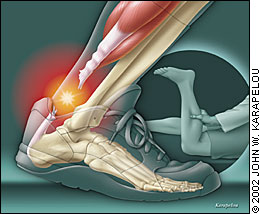
Am Fam Physician. 2002;65(9):1721

The article “Neurologic Complications of Prostate Cancer” on page 1850 exemplifies the American Academy of Family Physician's 2002 Annual Clinical Focus (ACF) on cancer. The educational initiative, which focuses on cancer prevention, detection, management, support and survival, was developed in cooperation with the American Cancer Society, National Cancer Institute, American Society of Clinical Oncology and National Human Genome Research Institute. The program is funded in part through educational grants from Bristol-Myers Squibb Company, Pharmacia Corporation and Novartis Pharmaceuticals Corporation. Although AFP does not receive sponsor support from this program, an emphasis is placed on ACF topics when possible and related articles bear the ACF logo:
The 2002 ACF program, which began in January, was launched at last year's AAFP Scientific Assembly. Then-President Richard Roberts, M.D., J.D., of Madison, Wis., noted that “family physicians provide more care to patients with cancer than any other physicians.” He said, “Scientific evidence suggests that about one third of the 550,400 cancer deaths expected this year will be related to nutrition, physical activity, and other lifestyle choices that could be modified through behavioral changes. Family physicians are at the forefront in preventing, detecting, and treating cancer and in helping patients make these necessary lifestyle changes.”
As Lewis E. Foxhall, M.D., and Andrew C. von Eschenbach, M.D., indicate in an editorial on page 1752 of this issue, family physicians are frequently called on to counsel patients about the value of prostate cancer screening using prostate-specific antigen (PSA) testing. Despite widespread use of the PSA test as a cancer screening tool, the value of the test in saving lives has not been proved, and the U.S. Preventive Services Task Force does not recommend the use of PSA screening until definitive evidence is available. Nonetheless, according to Drs. Foxhall and von Eschenbach, evidence now demonstrates that mortality rates and the incidence of advanced metastatic disease have substantially decreased since the onset of PSA-based prostate cancer screening, although a causal relationship has not been established. Family physicians should be prepared to help patients make informed decisions about prostate cancer screening.
In his article on neurologic complications of prostate cancer, Ramsis Benjamin, M.D., M.P.H., indicates that prostate cancer is the second leading cause of cancer-related deaths in men. Thirty percent of men more than 50 years of age and 70 percent of men more than 80 years of age will have histologic evidence of prostate adenocarcinoma. Nearly 10 percent of men will have a clinical diagnosis of prostate cancer in their lifetime, and nearly 3 percent of those will die of the disease. Advanced metastatic disease can lead to complications involving the central nervous system. Dr. Benjamin notes that family physicians should consider metastatic prostate disease in the differential diagnosis of new-onset low back pain or headache in men more than 50 years of age.
Upcoming ACF articles will include a special comprehensive review of the evidence regarding colorectal cancer screening and prevention.